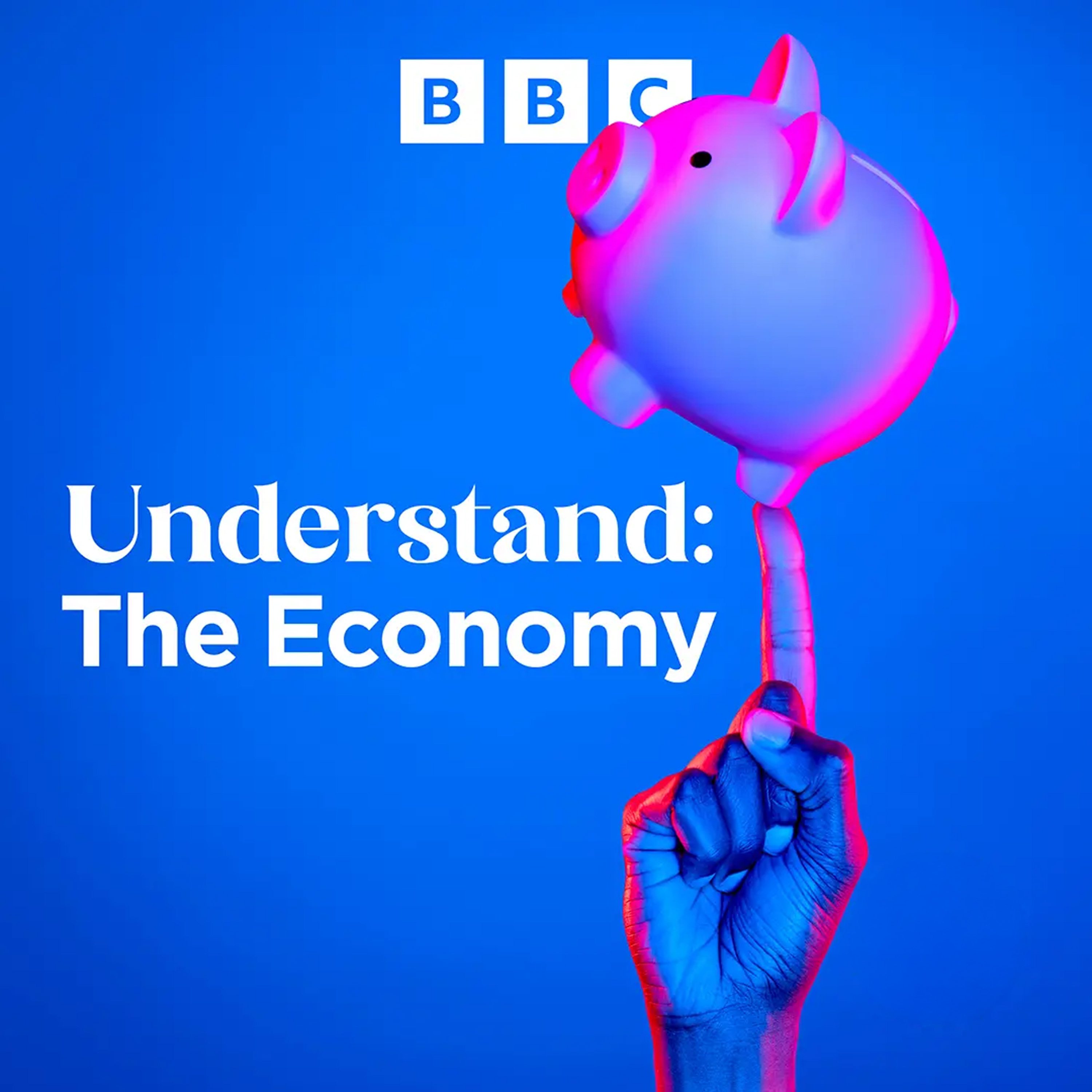The Economy: 7. Jobs and Unemployment
What happens when lots of people lose their jobs? Why might wages be low even though everyone who wants a job, has one? What do we mean by employment and unemployment and what does 'economic inactivity' mean? What is productivity and how does it relate to you and your job? Tim Harford explains, and Cambridge University Economic Historian Victoria Bateman tells the story of what happened when unemployment in the North East of England reached 70%.
Everything you need to know about the economy and what it means for you. This podcast will cut through the jargon to bring you clarity and ensure you finally understand all those complicated terms and phrases you hear on the news. Inflation, GDP, Interest rates, and bonds, Tim Harford and friends explain them all. We’ll ensure you understand what’s going on today, why your shopping is getting more expensive or why your pay doesn’t cover your bills. We’ll also bring you surprising histories, from the war-hungry kings who have shaped how things are counted today to the greedy merchants flooding Spain with silver coins. So if your eyes usually glaze over when someone says ‘cutting taxes stimulates growth’, fear no more, we’ve got you covered.
Guest: Professor Richard Davies, The University of Bristol
Producer: Phoebe Keane
Researcher: Drew Hyndman
Editor: Clare Fordham
Theme music: Don’t Fret, Beats Fresh Music
A BBC Long Form Audio Production for BBC Radio 4
Press play and read along
Transcript
Speaker 1 This BBC podcast is supported by ads outside the UK.
Speaker 2
You didn't start your company to manage payroll, file taxes, or chase invoices. But someone has to do it.
And that someone doesn't have to be you.
Speaker 2 Escalon Services handles your finance, HR, and accounting needs under one roof. So you get back to what you love, building your business.
Speaker 2
Head to Escalon.services and use the code San Fran for a special listener-only deal. Escalon.
Because founders deserve peace of mind too.
Speaker 4 Want to stop engine problems before they start? Pick up a can of C-Foam Motor Treatment. SeaFoam helps engines start easier, run smoother, and last longer.
Speaker 3 Trusted by millions every day, C-Foam is safe and easy to use in any engine.
Speaker 4 Just pour it in your fuel tank.
Speaker 4 Make the proven choice with C-Foam.
Speaker 4 Available everywhere. Automotive products are sold.
Speaker 4 Safe Home!
Speaker 1 Welcome to Understand the Economy, the podcast that takes you back to basics to explain how economics affects our everyday lives.
Speaker 3 And today, we're talking about jobs.
Speaker 1
You either want one or you have one or you've already had one and you've thought that's quite enough of that. Thank you very much.
I'm going to retire now. But that all raises a question.
Speaker 1
If you have a job, you're employed. That's easy enough.
So if you don't have a job, are you unemployed? Is a student unemployed? What about a retired person?
Speaker 1 This sounds like a job for the Director of Economic Statistics Production and Analysis at the Office for National Statistics. And fortunately, he agreed to explain it all to us.
Speaker 1 Here he is, Darren Morgan.
Speaker 5 So unemployment covers all those who aren't in paid work, but who are available for work and are actively looking for it.
Speaker 5 Employment means basically you are in paid work and that's whether full-time or part-time.
Speaker 1 And what about those who aren't in work and also aren't looking for it?
Speaker 5 There's something called economic inactivity, which basically says those not working, but they are not actively looking for it either.
Speaker 5 Inactivity has been falling over a long period of time, with the main reason more and more women have been joining work.
Speaker 5 At the the start of the pandemic, that trend inactivity quickly changed though and rose sharply. That made sense, didn't it?
Speaker 5 As if you lost your job, there was little point in looking for a new one when the economy was closed. However, it has continued to rise even though the economy has reopened.
Speaker 5 And a key feature has been in those over 50 who have left the labour market, either due to retirement or ill health.
Speaker 1 Darren Morgan of the Office for National Statistics.
Speaker 1 I'm delighted to be joined again by Richard Davis, Professor of Economics at Bristol University, Director of the UK's Economics Observatory and the author of Extreme Economies. Hello, Richard.
Speaker 3 Hello.
Speaker 1 I wanted to pick up on something else that Darren Morgan told us, which is the economic inactivity started to rise and has continued to rise since the pandemic.
Speaker 1
So these are people who not only don't have jobs, they're not looking for jobs. They're out of the labour force completely.
So it might be students, might be retired people, full-time parents.
Speaker 1 There are all kinds of reasons why.
Speaker 1 But it is very puzzling that there are so many economically inactive people now. Do we understand that puzzle?
Speaker 3 There are lots of parts to it. And if we look at what happened during the pandemic, I think it gives us some big clues.
Speaker 3 So, two important ones, Darren set out the different categories of economic inactivity are people that have decided to retire early or to not go back to work. So, this is people over 55, let's say.
Speaker 3 And we've seen rising inactivity there. And that may be because people have re-evaluated what's important in their lives.
Speaker 3
The country's been through this incredible shock. Many people have lost relatives, been through stress, and so on.
And they've downplayed the amount they're going to work.
Speaker 3 The perhaps even more concerning side of it is that people do end up long-term inactive when they are not seeking work because they're sick, because of long-term disability, or because of long-term mental health difficulties.
Speaker 3 And both of those things are obviously going to rise after a pandemic.
Speaker 1 Richard, as we speak in late 2022, there's a bit of a puzzle going on in the UK economy. Unemployment is incredibly low, and yet everybody seems to agree that things aren't actually going very well.
Speaker 1 So real wages are in decline. The government can't seem to collect enough tax revenue to fund basic public services.
Speaker 1 And so how can things be going badly when so many people who are looking for work have found it?
Speaker 3
The answer lies in productivity. So you're right, unemployment is really low, it's 3.5%.
And on top of this, we have a vacancy rate which is really high.
Speaker 3 So when unemployment is low, that means there aren't as many other people out there looking for jobs that could replace me if I threatened to quit.
Speaker 3 And so that gives me bargaining power with my employer.
Speaker 3 So if you're in a job, you're able actually, because your bargaining power is pretty high, you're able to kind of bid up your wage and to ask for a pay rise.
Speaker 3
So, what's happening is we do see people getting pay rises and actually quite strong pay rises. The problem is that prices are going up much faster.
Inflation is running at around 10%.
Speaker 3 And so, the inflation-adjusted value of people's wages is going down. And so, this is the kind of big picture reason why the economy is kind of in ill health.
Speaker 3 Why can't people get even higher wage rises?
Speaker 3 Well, that's because wage rises are justified not just because of your bargaining power, but it's also justified by a more fundamental reason, which is are you becoming more productive over time?
Speaker 3 Is your output in any given period going up? And that's what hasn't been happening in the UK.
Speaker 1 So, I mean, to put it in simple terms, if I can only produce £20,000 worth of value for my employer, my employer would be an idiot. to pay me £21,000.
Speaker 1 I can have all the bargaining power I like. I can demand £21,000, but the employer would rather not employ me at all than pay me more than I'm producing, which is what ties it back to productivity.
Speaker 3 Yes, that's right.
Speaker 3 And that's the sort of fundamental reason that any business, from a small business to a massive conglomerate, has a justification to give its workforce more pay and can do so without harming its bottom line.
Speaker 3 In the situation you outlined, in which you're not becoming more productive over time, but you're asking for ever higher pay rates, well, then something has to give.
Speaker 3 Maybe the company has less profit or it has to cut back on investment, but it's not sustainable in the long run.
Speaker 1 So the UK has its fair share of economic problems even though unemployment is near record low levels. But if you really want to see an economic catastrophe, look at a time of high unemployment.
Speaker 1 Here's Dr. Victoria Bateman of the University of Cambridge with the story of a time when unemployment reached appalling levels.
Speaker 6 On the 5th of October 1936, 200 men from Jarrow, together with their local MP Ellen Wilkinson, set out on a hunger march.
Speaker 6 Their plan was to walk by foot all the way from Jarrow in the northeast of England down to London with a petition.
Speaker 6 These men were angry. Unemployment in Jarrow had reached as high as 70%.
Speaker 6 The North East was reeling following the big recession in the early 1920s and then the Great Depression on top of it in the late 1920s and through into the 1930s.
Speaker 6 By 1934, the local shipyard, Palmer's Shipyard, and the local iron company had closed down, creating serious job loss.
Speaker 6 And families were literally starving. Families were hungry.
Speaker 6 They wanted to draw politicians' attention to the fact that there was such a lack of work in the area, that people were being pushed into poverty.
Speaker 6 And so they took to the roads and they spent the best part of a month walking town by town all the way to London to present their petition to Parliament. So initially the marchers felt ignored.
Speaker 6 They felt neglected. They felt that their demands and and their month-long walk all the way to London was being ignored.
Speaker 6 But actually, this Jarrow march has gone down in history and helped to draw attention to the plight of the north of England, which was suffering really heavy job loss at the time.
Speaker 6 In the 1930s, in the north of England, unemployment was about 29%.
Speaker 6 In Scotland, it was about 28%,
Speaker 6 whereas in London, further south, it was about 14%.
Speaker 6 And so, that north-south divide that lives on today can be traced all the way back to the 1920s and 1930s.
Speaker 1 Dr. Victoria Bateman.
Speaker 1 Richard Davis, we've discussed our problem in the UK now. It's not very high unemployment, it's very low productivity.
Speaker 1 So, that means that individual workers are just not producing much of value per hour. So, why is productivity in the UK low?
Speaker 1 Which, just to remind everybody, is the explanation for why wages aren't going up. It's the explanation for why we can't all seem to make ends meet, even though there are lots of jobs around.
Speaker 3
We do face this kind of unique British productivity puzzle. I think there are a few things going on.
In the early years following the financial crisis, so let's say up to the period maybe 2015,
Speaker 3 One of the key culprits was the banking sector. We had this problem of the credit supply to companies and that's one reason people thought that productivity was down.
Speaker 3 So everything from small businesses to medium-sized companies were unable to access credit. And the UK's investment levels during that period are not particularly high.
Speaker 3 So low investment means fewer newer computers, fewer newer machines in factories and that's going to prevent your economy from growing.
Speaker 1 Right. So that's the story up to 2015.
Speaker 1 The banking sector particularly hard hit, very concentrated, very very big banks, and they're not loaning money to businesses who could then invest that money in growing their businesses, in buying new equipment.
Speaker 1 So come 2016, everything should be fine, right?
Speaker 3 Yeah, the puzzle is why has it continued?
Speaker 1 Does the fact that the UK is very reliant on services make a difference?
Speaker 1 I mean, just to explain myself, when I think of the typical British economy job, I'm thinking insurance, I'm thinking legal, I'm thinking advertising, the creative industries, computer games, film.
Speaker 1 There's so many things that the UK economy does well that are services.
Speaker 1 And then I think about, say, South Korea, or I think about Japan, or Taiwan, or Germany, and I'm thinking making cars, making computer chips, making the computers, making the phones.
Speaker 1 Also very high-value activities, but a different kind of thing, manufacturing physical stuff rather than providing services. Does that shed any light on this productivity question?
Speaker 3 I think it does. I think it's important to realize that there's going to be a spectrum of industries in which it's, in some sense, almost natural that in some you don't get productivity rises.
Speaker 3 So, the economist that gave this idea to us was called William Beaumoll. And the example he used was of a string quintet.
Speaker 3 So, five people playing violins and playing Mozart's music to a known length of piece. There is literally no way way that you can make that more productive.
Speaker 3 You need the five people, you need the five instruments, and you know how long the piece is.
Speaker 3 And so, he set out this idea as a reminder to economists that some things in the economy are going to find it really hard to improve in productivity.
Speaker 3 And the issue is that lots of the things that the UK does now, but also we think are going to become more important, are sort of down towards the end of that scale.
Speaker 3
So, think of the care sector, for example. If somebody needs a carer, they need an actual human being, a certain number of hours to be their carer.
Well, that's highly tailored individual care.
Speaker 3
It needs to be one-to-one. It's very close to the Mozart quintet example.
You can't suddenly ask that carer to be looking after two people at the same time and expect the same quality of care.
Speaker 3 So this is why something like the care system is going to be very difficult to increase productivity without diminishing on quality and very different at the other end of the scale to your example let's say Samsung in South Korea producing flat screen TVs.
Speaker 1 And is there anything that we can do to improve productivity?
Speaker 3 So in an economy like the UK as we've discussed the principal input actually is people. It's people showing up for work and doing their jobs.
Speaker 3 And so the simple answer to your question is we need to do everything we can in the economy to get people doing their jobs as well as they they can, and that means investing in them.
Speaker 3 So, it's everything from training for people, it's the machines they use in terms of computers, those in the service sector.
Speaker 3 Where we do still have manufacturing, and the UK still does have some very high-end technical manufacturing companies. We need to get them investing in bigger, faster, better machines.
Speaker 3 So, it's doing everything you can to get people, as they're going to work, to be as productive as they can be.
Speaker 1 Richard Davis, thank you very much.
Speaker 1 So you might think everyone having a job is a good thing, and I suppose it is, but it turns out that even though lots of people have jobs, our wages still won't rise unless we make twice as many things or just speed up that Mozart string quintet.
Speaker 7 With the Wealth Front Cash Account, you can earn 4% annual percentage yield from partner banks on your cash until you're ready to invest.
Speaker 7 The cash account grows your money with no account maintenance fees and free instant withdrawals whenever you need it. Money works better here.
Speaker 7
Go to wealthfront.com to start saving and investing today. Cash account offered by Wealthfront Brokerage LLC member Fenra SIPC.
Wealthfront is not a bank.
Speaker 7 The APY on cash deposits as of December 27, 2024 is representative, subject to change, and requires no minimum. Funds in the cash account are swept to partner banks where they earn the variable APY.
Speaker 8
Sucks! The new musical has made Tony award-winning history on Broadway. We demand to be home.
Winner, best score. We demand to be seen.
Winner, best book. We demand to be quality.
Speaker 8 It's a theatrical masterpiece that's thrilling, inspiring, dazzlingly entertaining, and unquestionably the most emotionally stirring musical this season.
Speaker 3 Suffs!
Speaker 8 Playing the Orpheum Theater October 22nd through November 9th. Tickets at BroadwaySF.com.


